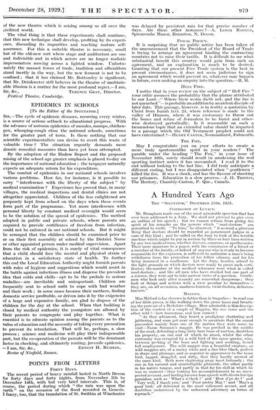EPIDEMICS IN SCHOOLS
[To the Editor of the SPECTATOR.] SIR,—The cycle of epidemic diseases, recurring every winter, is a source of serious setback to educational progress. With the advance of autumn epidemics of measles, mumps, chicken- pox, whooping-cough close the national schools, sometimes for the greater part of term. Is there nothing that our scientific experimentalists can devise to avert this waste of valuable time ? The situation urgently demands more drastic remedial measures- than have yet been attempted.
By the adoption of the Hadow Report and the proposed raising of the school age greater emphasis is placed to-day on the importance of national education ; the taxpayer naturally expects an adequate return for his expenditure.
The combat of epidemics in our national schools involves various problems. How far, for instance, is it possible to carry " interference with the liberty of the subject " by medical examination ? Experience has proved that, in many villages, the medical inspections and dental clinics are not altogether appreciated. Children of the less enlightened are purposely kept from school on the days when these events form part of the programme. Yet more interference with personal liberty by constant medical oversight would seem to be the solution of the spread of epidemics. The method adopted in public and private schools, where parents are required to provide certificates of freedom from infection, could not be enforced in our national schools. But it might be arranged that the children should be examined prior to or on their first assembly at school by the District Nurse or other appointed person under medical supervision. Apart from the risk of epidemics, it is surely of vital consequence that a child should face the mental and physical strain of education in a satisfactory state of health. To further this end the Local Education Authority might furnish parents with rules of hygiene and suggestions which would assist in the battle against infectious illness and disperse the prevalent idea that colds and chills—apt to be the prelude to serious maladies—are inevitable and unimportant. Children are frequently sent to school unfit to cope with bad weather and their work ; in some cases because their mothers, finding domestic service profitable, or driven into it by the exigencies of a large and expensive family, are glad to dispose of the children for the day at the school. When that building is closed by medical authority the youngsters are allowed by their parents to congregate and play together. What is essential is to educate opinion among the parents as to the value of education and the necessity of taking every precaution to prevent its retardation. That will be, perhaps, a slow process ; science and medicine will play their indispensable part, but the co-operation of the parents will be the dominant factor in checking, and ultimately routing, juvenile epidemics.
































 Previous page
Previous page